In this section Tolstoy gives us again a scene in which a bunch of upper class socialites are attending a party and behaving falsely. It reminds me of gatherings I’ve attended at art galleries, etc. Sometimes they can be really fun, but other times they are really boring, especially when you see it’s just a bunch of people who already know each other and seem to only be interested in talking about their own inside jokes or reliving their good old high school days or talking about people who have long since moved away. Then it can be pretty pointless and empty seeming.
Even worse, I once attended an annual party with the theme of “Pimps and Ho’s,” [sic]. In case you don’t know what this is, the Pimps & Ho’s theme party was popularized by rap musicians in the late 1990’s or early 2000’s. People attending these parties dress up like either hookers or pimps and drink a lot of whatever they imagine rappers or pimps and hos drink, (in other words, everything). Usually there is a lot of drug-doing going on as well. It ends up with everyone trying to outdo each other in crassness and debauched behavior, but in a very affected and pathetic way, (though I doubt any of them has ever heard the word “debauched” before). What it actually boils down to is a group of acquaintances who are drawn together by the fact that they frequent the same watering hole, parading around in too few clothes in mid-November, each hell-bent on doing something legendarily outrageous, most of whom end up puking on the host’s lawn before shambling away at sunrise.
The Pimps and Ho’s party was hardly the same as the soiree Nekhlyudov wades through to talk to Maslennikov, but there seemed to be a similar pervasive air of artificiality—the least of which were the ridiculous costumes worn by the pimps and hos. I heard several exchanges of phone numbers at that party that sounded like this, “Hey, give me your phone number again? Every time you tell me it I lose it, but this time I’m gonna call you and we’ll get drunk!” I’ve no doubt this was finally the magic occasion where they managed to make good on this promise.
There was a guy who was hugging everyone and who seemed genuinely friendly and interested in what other people had to say. As soon as he left, everyone complained about how much they hated him. Most people would be really friendly to someone when they walked past, then badmouth them as soon as they were out of earshot. This is what reminds me of the Maslennikovs’ party. The way everyone is offended by Nekhlyudov’s abrupt departure and talks about him afterwards reminds me the way everyone at the Pimps & Ho's was offended by the too-friendly guy and badmouthed him when he left. It seems more absurd, though, since Nekhlyudov actually did behave somewhat rudely whereas this guy was just being friendly. I remember Nekhlyudov geting annoyed at jury duty because an overly friendly guy ignored social mores and was too familiar with him until he (Nekhlyudov) found more important things to occupy his mind, namely Maslova.
There is an interesting contrast between the upper class social gatherings Nekhlyudov attends and the scenes at the prison. All of the interactions at the prison are more genuine than the upper class get-togethers, whether they take place in the cells or in the visiting room. I think part of what Tolstoy is saying is that the leisured classes have built up all of this affectation to cover up the fact that they have nothing better to do. At least learning and maintaining all of these social regulations gives them something to occupy their time when they aren’t depriving prisoners of their civil rights and/or having them flogged. I’m hoping to see Nekhlyudov interact with the peasants on his estate to see what that is like.
This is unrelated, but I don’t understand why the political prisoners seem to have it so much easier than the other prisoners, which is what we see when Nekhlyudov goes to visit Vera Oh-God-I-can’t-say-her-name-a. Their visiting room doesn’t have mesh wires between the visitors and the prisoners. I’m guessing it’s because they are probably mostly upper class and respectable middle class people. I think they would be the only ones who could afford the luxury of being radical; both literally because they have access to education and reading materials and free time, also because their status protects them from harsher punishment. If there are any poor “political” prisoners, they probably get thrown in the regular, lice-ridden jail on trumped-up or fabricated charges, like the Menshovs or the 130 men with expired passports.
8 hours ago













No comments:
Post a Comment